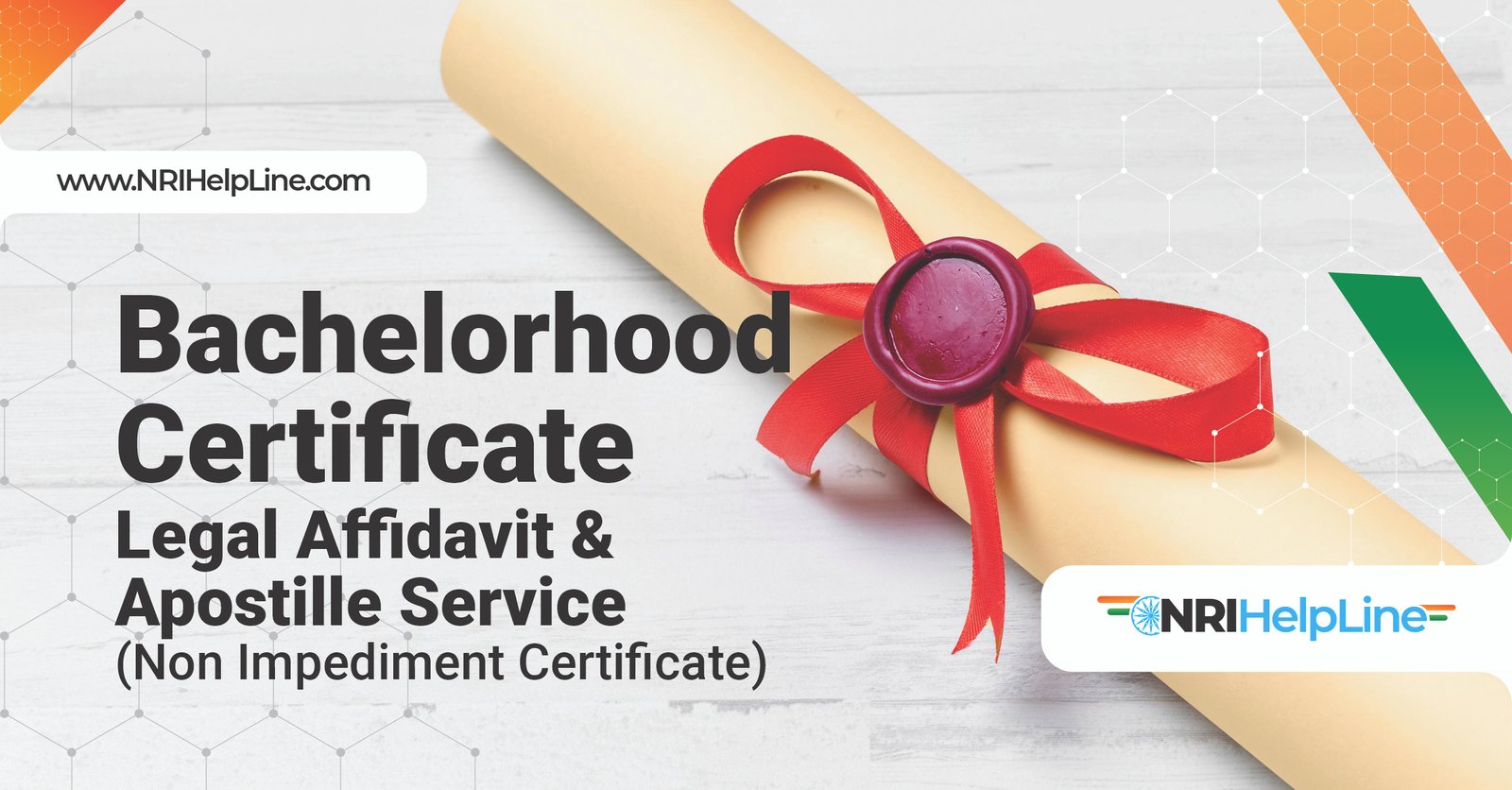What is a Bachelorhood Certificate?
A Bachelorhood Certificate (also known as a Certificate of No Marriage Record (CENOMAR) is a legal document that confirms an individual’s unmarried status. While many countries issue an official CENOMAR, India does not have a government-issued Bachelorhood Certificate. Instead, NRIs must submit a self-declared affidavit attested by Indian authorities.
This document is often required for:
-
- Marriage in foreign countries (UAE, USA, Europe, etc.)
- Visa and immigration processes (spouse visa, residency applications)
- Legal compliance (preventing bigamy allegations under Indian law)
- Since there is no centralized marital database in India, the affidavit system serves as a workaround for NRIs needing proof of single status.
Why Do NRIs Need a Bachelorhood Certificate?
A. Marriage Abroad
Many countries require a Bachelorhood Certificate (Non Impediment Certificate) before allowing a foreign national to marry. For example:
-
- UAE – Mandatory for marriage visa applications.
- USA & Europe – Often required for spouse visas.
- Southeast Asia – Needed for legal marriage registration.
B. Visa & Immigration Processes
Some countries ask for marital status verification when applying for:
-
- Spouse visas
- Permanent residency
- Work permits
C. Legal Protection Against Bigamy
Under Section 494 of the Indian Penal Code (IPC), bigamy is a criminal offense. A Bachelorhood Certificate helps prevent false allegations by legally documenting unmarried status.
Is a Bachelorhood Certificate Legally Valid in India?
Unlike a Marriage Certificate, India does not have a standardized Bachelorhood Certificate. However, the following process makes it legally acceptable:
-
- Affidavit Submission – A self-declaration before a Notary or Magistrate.
- SDM Attestation – Verification by the Sub-Divisional Magistrate (SDM).
- MEA Apostille – For international use, the document must be apostilled by the Ministry of External Affairs (MEA).
Legal References:
-
- Indian Evidence Act, 1872 – Affidavits are admissible as evidence.
- Apostille Convention, 1961 – Ensures global recognition of apostilled documents.
Step-by-Step Process to Obtain a Bachelorhood Certificate
A. Drafting a Notarized Affidavit
-
- Format: Must include:
- Full name, father’s name, passport details
- A declaration: “I am unmarried and have never been married.”
- Notary stamp & signature
- Format: Must include:
-
- Where to Get It:
- Indian Notary Public / Oath Commissioner, Indian Embassy (if abroad, but final attestation must be done in India)
- Where to Get It:
B. SDM Attestation Process
-
- Submit the affidavit to the local SDM office (based on Indian address proof).
- The SDM verifies details and stamps the document.
- Some states require Home Department attestation after SDM approval.
C. MEA Apostille for International Use
-
- Required for countries under the Hague Convention.
- Submit the attested affidavit to:
-
- MEA, New Delhi (or state RPOs like Mumbai, Chennai, etc.).
-
- An apostille sticker is attached for global validity.
D. Translation Requirements (If Applicable)
-
- For non-English speaking countries (e.g., Spain, Germany), a certified translation may be required.
- Must be done by an authorized translator.
Documents Required for a Bachelorhood Certificate
| Document | Purpose |
|---|---|
| Passport Copy | Identity Proof |
| Address Proof (Aadhaar/Voter ID) | SDM Jurisdiction Verification |
| Affidavit Draft | Self-declaration of unmarried status |
| Passport-size Photos | Submission to authorities |
| Authorization Letter (If using an agent) | For NRIHelpLine representation |
Common Challenges & How to Avoid Them
Challenge 1: Delays in SDM Attestation
-
-
-
Solution: Work with a trusted agency (like NRIHelpLine) to expedite.
-
-
Challenge 2: Incorrect Affidavit Format
-
-
-
Solution: Use a legally vetted template.
-
-
Challenge 3: MEA Apostille Rejections
-
-
-
Solution: Ensure SDM attestation is clear before submission.
-
-
Why Choose NRIHelpLine for Your Bachelorhood Certificate?
-
- End-to-End Assistance – From affidavit drafting to apostille.
- Fast Processing – Avoid bureaucratic delays.
- Transparent Pricing – No hidden fees.
- Global Courier Support – Free delivery in India; international shipping at minimal cost.
FAQs on Bachelorhood Certificates for NRIs
Q1. Can I get this certificate from the Indian Embassy?
No, the affidavit must be processed in India via SDM & MEA.
Q2. How long is the certificate valid?
Most countries accept it for 6 months to 1 year.
Q3. What if I were married before?
You must submit a Divorce Decree or Death Certificate of the former spouse.
Q4. Can I apply for it while abroad?
Yes, but you’ll need an authorized representative in India.
Conclusion
For NRIs, obtaining this certificate involves navigating Indian legal processes. By following the correct steps—affidavit drafting, SDM attestation, and MEA apostille—you can ensure hassle-free documentation for marriage or visa purposes.
Need Expert Help? Contact NRIHelpLine today for a seamless experience!
Additionally, you can explore more about other Service on our services on our NRIHelpline.
Follow us for more on Twitter | Instagram | LinkedIn | Facebook
External Resources: Income Tax Department India
Disclaimer: The information provided on this website, NRIHelpLine.com or this is for general informational purposes only. All information on the site is provided in good faith; however, we make no representation or warranty of any kind, express or implied, regarding the accuracy, adequacy, validity, reliability, availability, or completeness of any information on the site. Any reliance you place on such information is therefore strictly at your own risk. NRIHelpLine Management shall not be liable for any losses or damages in connection with the use of this information



